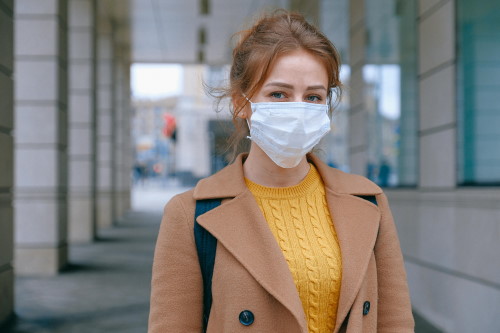During the winter, doctors see patient after patient with cold and flu symptoms. Here's how they avoid getting sick—tips you can steal to say healthy all year long.
Between 3% and 11% of the US population gets sick with the flu each year, according to the Centers for Disease Control and Prevention (CDC)—and the common cold is even more widespread. The National Institutes of Health (NIH) estimates that most of us catch a cold two to three times each year.
One of the best ways to avoid getting sick is quite simple, according to Prianka Chawla, MD, Primary Care Physician at Tufts Medical Center: Keeping your distance from people who are sick. But because of their working environment, healthcare professionals are at an increased risk of getting sick—and according to research published in Influenza and Other Respiratory Viruses, this is true for professionals across almost all healthcare settings.
That means doctors must be extra diligent about keeping healthy habits that help them avoid getting sick. To help you stay healthy this cold and flu season, top medical experts share exactly how they keep their immune systems strong.
BREAKING: This Keeps Your Blood Sugar Below 100 - Even When You're Eating Sweets!
They exercise
“For me, regular exercise is the best medicine,” Dr. Chawla says. “I like group exercise for accountability and community—and also value having ‘take anywhere’ exercise that requires no equipment except supportive shoes. Walking is the best!”
Other physicians agree wholeheartedly. “People who do regular light to moderate exercise tend to have an overall lower risk of colds and infections,” explains Shane Davis, MD, a Non-Operative Sports Medicine Physician at Tufts Medical Center. “Exercise is a huge priority for me,” adds Cory Fisher, DO, a family medicine physician at the Cleveland Clinic. “I try to start every day with 45 to 60 minutes [of exercise] and mix up my cardiovascular and resistance training.”
They wear masks when traveling
Due to their risk of exposure to illness, many doctors are still wearing a mask at work—especially when a lot of colds and respiratory viruses are circulating.
“I tend to [also] wear a mask when taking public transit,” says Jeremy Blanchard, MD, PhD, a board-certified Family Medicine physician at Columbia University Irving Medical Center. “There tends to be circulating viral illnesses year-round, even at low levels. To reduce my likelihood of developing illness, I tend to mask when taking the bus, train, or subway, especially when it is crowded.”
“I would also consider wearing a mask on an airplane—whether going or coming from a vacation, there is no harm in trying to reduce the chances of being exposed to a cold by strangers in a packed environment,” adds Dr. Chawla. “[This] is regardless of season, though expect it to be more of an issue in winter.”
They monitor community stats
“I monitor community levels of Covid and flu and will mask in public if circulation is high, especially in crowded and indoor spaces,” Dr. Fisher says.
You can check your state or county health department’s website for estimates on flu and Covid circulation in your community, with data generally updated weekly.
They get enough sleep
“Getting a minimum of seven hours of sleep per night is very important for health overall,” Dr. Fisher says. “If you’re run down and not getting the sleep you need, it’s not only more difficult to fight off infections—but also very hard to wake up to have that workout!”
Dr. Chawla recommends maintaining a consistent bed and wake time as much as your schedule allows. “Getting regular physical activity, enjoying caffeine (if you choose to) earlier in the day, avoiding alcohol, and separating screen time from bedtime is helpful.”
They manage their stress
“Stress is a part of everyday life, and the right dose helps us get things done,” Dr. Chawla explains. “But persistent stress or stress without a clear trigger can potentially impact your mental and physical health in many ways—and can leave you more vulnerable to feeling or getting sick.”
There is a very strong relationship between one’s physical and emotional well-being, Dr. Fisher adds—and he says that eating right, getting regular exercise (especially resistance training), and having a good sleep schedule can make a huge difference in how you feel. “If stress is an issue, I think having a behavioral therapist is essential to work on self-care and effective coping skills.”
They prioritize nutrition & hydration
Nutrition may be a key tool if you want to stop a cold when you feel one coming on. “I try to make sure I am as healthy as possible when I recognize I am coming down with a cold or other viral illness,” Dr. Blanchard says. This means staying hydrated, getting plenty of sleep, and eating a balanced diet. (As well as avoiding alcohol and smoke exposure, he adds.)
“The good news is that most of the foods I eat to stay healthy—and potentially help prevent me from getting sick—fall in the same categories of nutrients I prioritize for preventing chronic disease,” Dr. Chawla says. These foods include vegetables (especially dark green veggies) and fruit, which have tons of vitamins and fiber. Also on her list: Legumes, nuts, whole grains, lean proteins, and plenty of hydration. “The way I think about it is that the nutrition you give yourself for long-term health will help to defend against [seasonal] viruses and other limited illnesses.”
They may take zinc tablets
While there’s not irrefutable evidence that any specific vitamins or minerals will prevent illness, zinc may help ease an oncoming cold. Clement S. Rose, MD, an internal medicine specialist at Weiss Memorial Hospital in Chicago, says he takes zinc tablets at the first sign of symptoms. “Some studies have shown zinc to be effective in reducing the number of days a cold lingers.” Research published 2023 in BMC Public Health suggests that vitamin C may also help with colds by reducing the severity of your symptoms.
They wash their hands (or use hand sanitizer)
“Hand washing is one of the most important measures for preventing the spread of disease—and one that is largely under our control,” Dr. Chawla says.
Plus, while it can be difficult to avoid getting sick when someone in your house is under the weather, more frequent hand washing is Dr. Blanchard’s go-to advice for lowering your risk of catching a family member or roommate’s illness.
As a general rule, Dr. Chawla says to wash your hands after:
-
Touching shared surfaces—such as doors, knobs, or handles.
-
Shaking hands with other people.
-
Sneezing or coughing into your hands.
-
Before handling food or touching your face.
“Both soap and water and alcohol-based hand sanitizer are good ways to wash hands when used properly,” she says. “Soap and water may be better for certain germs and also for mobilizing dirt and debris from the hands and beneath the nails.” Handwashing and hand sanitizer both have the potential to dry out your skin—it’s different for everyone—so she says to just keep note of what works better for you.
They try to avoid touching their face
“I try to keep my hands away from my face all of the time,” Dr. Fisher says. “So many germs are spread through hand contact.” Viruses can easily access your upper respiratory system when coming into contact with your face, Dr. Chawla explains.
They get the flu shot
Getting a seasonal influenza vaccine is an excellent preventive measure for avoiding flu. Dr. Rose says he gets the flu shot each year and recommends it for everyone who’s eligible. “It’s not perfect, but overall, it helps fight the potentially deadly infection,” he says.
According to the CDC, the flu vaccine reduces the risk of illness by between 40 and 60%—but there’s a major secondary benefit. Even if you do catch the flu, vaccinated people tend to experience milder symptoms and have a much lower risk of flu-associated hospitalization.
They don’t eat at their desk
If you tend to work through lunch—that is, touching your keyboard, phone, and other desk items between bites—you’re passing these workstation germs right into your mouth, says Michele Neil-Sherwood, DO, a double-board-certified physician and founder of the Functional Medical Institute in Tulsa, OK. She suggests that you use your lunch hour as a chance to take a true break from work—or at least sneak off long enough to eat your lunch away from your desk. (And don’t forget to wash your hands before eating!)
TRENDING: Viagra Obsolete: New Invention Cheaper, Safer, Faster
They close their office door
Like most people who work in an office, doctors can’t avoid interacting with others, but keeping the door to their office closed when possible helps limit contamination, says Kristine Arthur, MD, an internist at MemorialCare Medical Group in Laguna Woods, CA.
They stay home
Often, the best way to shorten your cold or flu is simply to stay at home. Your body needs rest to fight off infection and get you back on your feet—and it’s much easier to prioritize good nutrition, hydration, sleep, and stress management when taking some downtime.
“It is also important to do your best to avoid exposure to other infections,” Dr. Blanchard says. “So staying home when sick not only helps reduce spreading viral illness to others, it can help limit developing secondary or superimposed infections.”









